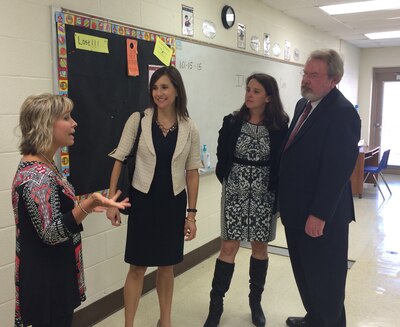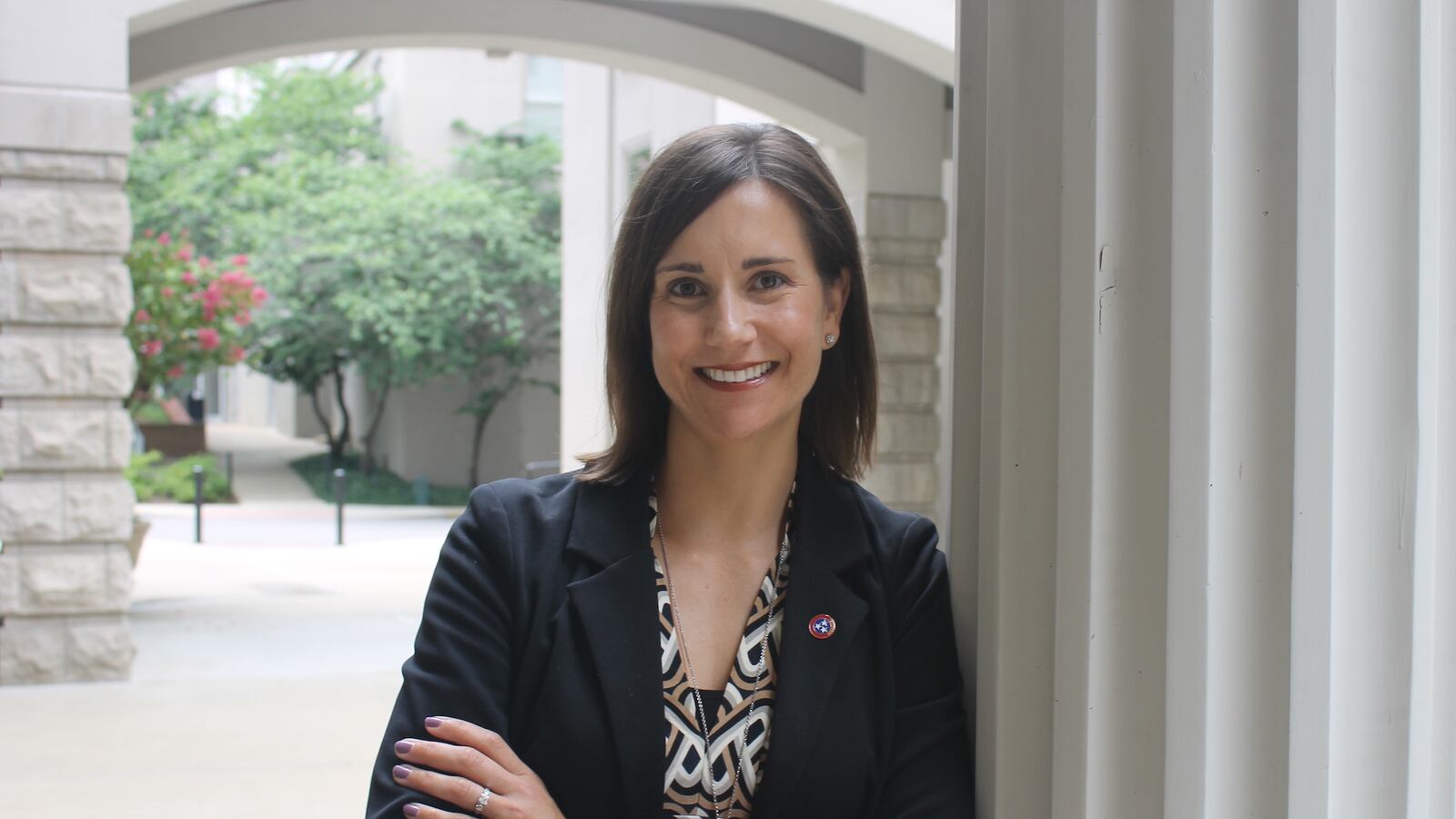Sara Heyburn became executive director of the Tennessee State Board of Education in January 2015, on the same day Candice McQueen began serving as the state’s education commissioner.
Though well-versed about Tennessee education policy — she was the K-12 adviser to Gov. Phil Bredesen before serving as an assistant commissioner of teaching and learning at the Tennessee Department of Education — much of her work with the State Board has been in unchartered territory.
Under her leadership, the board has grappled for the first time with questions about authorizing and closing charter schools, which were introduced to Tennessee under a 2002 state law. The state’s unsuccessful transition to a new standardized test last school year also has raised questions about how to hold districts, schools and teachers accountable during a season of change.
Beyond policy, Heyburn knows education at the classroom level. She taught high school English and coached cross-country track in Brentwood, Tenn., and worked as a literacy teacher in Louisville, Ky.
She sat down recently with Chalkbeat to talk about what the State Board does, and what education policy priorities are on the horizon.
Here are the highlights, which have been edited and condensed.
Tennessee’s education policy apparatus can be confusing. It has a State Board of Education and the Department of Education. How do these entities relate, and what is your role?
The State Board specifically is nine voting members appointed by the governor who then select their executive director, so I’m hired by the board members. And their charge is to be the policymaking body. It’s a very broad charge. They make policies that govern everything from nutrition standards to school bus safety to teacher evaluation policy to licensing requirements to teacher preparation approvals. The department also brings policy proposals and recommendations to the board, often according to what they’re seeing on the ground. (Board members) all have day jobs, and are consumed by other things during many of their working hours. Their expectation of their executive director is that I build out and maintain a strong team to support them in decision-making. They’ve also been willing to serve on subcommittees based on emerging issues that we think are important, like teacher preparation.
Why has teacher preparation become a priority for the State Board?
"We really need to make sure our partners in teacher preparation are working from the same playbook."
It’s something that has been under the radar for most stakeholders across the state. When you look at the work we’ve taken on as a state to support high-quality instruction in our schools, there’s a pipeline when looking through the lens of teacher evaluation and how we think about supporting teachers in the areas where they need to grow, how you think about leadership and capitalizing on teachers who have shown to be effective, and how they can mentor other teachers in need of professional development. These people are coming from somewhere; they’re being trained in institutions across the state at places the state approved. We really need a head start helping teachers do the work they’re being asked to take on. The work has changed, with more rigorous standards, with new teacher evaluations, with assessments. What’s the right amount of assessment? How do you really learn from them? All of those things should start in our teacher preparation programs. We really need to make sure our partners in teacher preparation are working from the same playbook.
You were a classroom teacher for six years, and received your master’s degree in education from the University of Virginia. How does your own experience with teacher preparation inform your work?
I was fortunate to go to a really strong program. I did a five-year program. I did my bachelor’s degree in English and my master’s in teaching. When I moved from Virginia and began teaching (near) Nashville, I was very divorced from the place where I had been trained. It’s a scary place to be when you’re a first-year teacher, on your own without any support from your teacher preparation program. I like to use the analogy of learning to ride a bike. Teacher training is often about looking at a picture of the bike‚ understanding the wheels and the parts of the bike. But for most of us, you don’t learn to ride the bike until you’re on that bike. Ideally, the first time you ride a bike, you have training wheels or someone holding onto you. You don’t just get on the bike and hit the highway. And yet oftentimes, that’s what we’re doing with teachers. You’re solo on the highway. And that was sort of the feeling I had.
We need to think about a partnership between the district hiring the new teacher and the preparation program that’s behind this teacher. Even if it’s out of state, there’s still a relationship, it’s not just a handing off the baton. There’s a responsibility on the teacher prep side to ensure a smooth transition into the classroom. Similarly, there’s a responsibility on the district’s part to support that new teacher and be in conversations with the prep program on what they’re finding to be successful across the candidates they hired and where the program might want to spend more time training teachers so they can be successful.
Why did you decide to go into education?
My parents were strong advocates for public education. My mom had been a public school teacher. My dad was a lawyer, but he served on the local school board in Louisville, where I went to school. My grandmother had been a teacher. (There wasn’t a high school in my other grandmother’s hometown, so she) went to the eighth grade three times until she could get a job as a nanny in a town where she could get a high school education. So, education was very much valued and prioritized. And I loved school, I loved my teachers. I knew I wanted to work with children and I thought I would be a pediatrician. About halfway through college, I realized I really loved my English classes. I loved my volunteer work with students in local schools, and there was a really strong education program at the University of Virginia, so I transferred into the School of Education.
You left the classroom to get your doctorate in education at Vanderbilt, and then to work in the governor’s office and the Tennessee Department of Education. Why did you leave the classroom?

I taught for six years and by the time I got to my fifth or sixth year, Bill Gates had just given a $1.5 billion grant to create smaller schools within schools. And I spent the summer thinking … was that really the best use of that $1.5 billion? Where was the research? Where was the rationale for using it that way? It was that realization: that there were a lot of people giving money who hadn’t necessarily been in the classroom. It just seemed like there were so many decisions being made about public education that were outside my control. I thought, I want to go where the decisions are being made and bring my lens as a teacher to the policy conversation.
The State Board has the final say on the state’s education accountability policies. At the board’s last meeting in May, members voted to suspend the state’s accountability system for grades 3-8, meaning that test scores this year won’t be used to evaluate teachers, schools or districts. That’s because most students in those grades weren’t able to complete TNReady this year. What was that conversation like?
Our board members are very concerned about the fact that we don’t have grades 3-8 data that we can use for accountability this year. That data tells us something very important and real about student learning across the state. It helps us understand where our achievement gaps are and where our resources are being used well and where we really need to look harder at what’s happening on the ground. Equity and our ability to deliver a high-quality education to all students really rests on having that data to understand student learning. Our board, while certainly sympathetic and understanding of what happened this year, absolutely does not want to see that happen again. How do we make sure we are never in that position of making that decision again?
The state has the opportunity to overhaul its policies around teacher evaluation and accountability because of the new federal education law, the Every Student Succeeds Act. Ultimately, changing that policy will fall to the State Board. What do you see changing? Do you think we’ll move away from using test data in teacher evaluations?
"... I strongly feel like we need a system (of evaluation) that honors teaching and teachers by giving them regular feedback. "
As a former teacher, as someone who felt like I could’ve benefitted from feedback and support, I strongly feel like we need a system that honors teaching and teachers by giving them regular feedback. Our current teacher evaluation system, while under continuous improvement, has come a long way toward having those focused conversations on instruction several times a year. I’m hoping as a state we can stay the course with a system that honors teaching, and that has to come with some sense of accountability for results. The multiple measures are really the strength of our system. Over time, we’ll see what other measures we want to incorporate, but the foundation is observation and student growth.
What’s been the biggest challenge in your time at the State Board?
The charter work is sort of a perpetual challenge because we have a clear charge in the statute to model high standards for authorization of charter schools. Under my tenure, we’ve had our first closure appeals. This is about closing schools that have real students and real families attached to that school. We really struggled. The decision to close a school is not one anyone takes lightly. Ultimately, we voted to close those schools. And that was a hard decision, that was a challenge. And I think the state’s role in terms of charter schools will always be a challenge, because we’re looking at local decisions and trying to re-evaluate if they were in the best interest of students.
What are you most proud of?
We took on the law that said the State Board had to meet in Nashville. Obviously, Tennessee is a really long state. A lot of stakeholders have trouble getting to Nashville. The first meeting we had outside of Nashville was in Johnson City, at East Tennessee State University. We were so welcomed. We really got to hear from people across the state. We were coming to their hometown, and bringing our work to them.
Editor’s note: Periodically, Chalkbeat conducts Chalk Talk interviews with a leader, innovator, influential thinker or hero across Tennessee’s education community. Email your suggestions for future subjects to tn.tips@chalkbeat.org.

